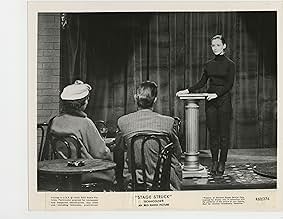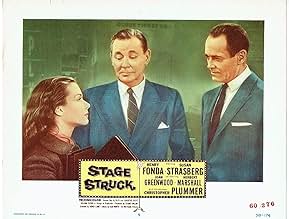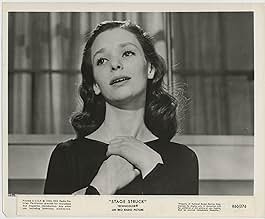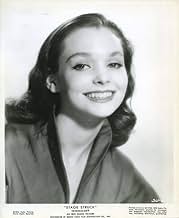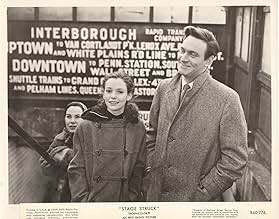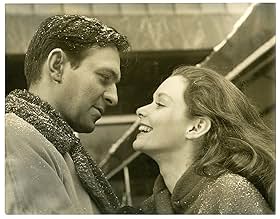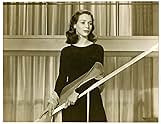PUNTUACIÓN EN IMDb
5,9/10
876
TU PUNTUACIÓN
Una joven llega a Nueva York decidida a convertirse en una gran estrella teatral, pero descubre que su objetivo puede no ser tan fácil de alcanzar como esperaba.Una joven llega a Nueva York decidida a convertirse en una gran estrella teatral, pero descubre que su objetivo puede no ser tan fácil de alcanzar como esperaba.Una joven llega a Nueva York decidida a convertirse en una gran estrella teatral, pero descubre que su objetivo puede no ser tan fácil de alcanzar como esperaba.
- Dirección
- Guión
- Reparto principal
Pat Harrington Sr.
- Benny
- (as Pat Harrington)
Pat Englund
- Gwen Hall
- (as Patricia Englund)
Merle A. Ashley
- Minor Role
- (sin acreditar)
Dario Barri
- Handsome Young Man
- (sin acreditar)
Rolly Bester
- Minor Role
- (sin acreditar)
Leon Bibb
- Guitar Player
- (sin acreditar)
Reseñas destacadas
Along with "All About Eve" this is one of the finest films dealing with the American theatre. I don't understand why it is a lost film and would urge anybody who enjoys great acting to hunt this film down any way they can. It is also about time it was released on video. Susan Strasberg was clearly one of Hollywood's casualties and it's tragic that the films she made after this were perhaps determined by the mediocre reaction at the time to this film.
Some people are born with talent. Some can acquire it. Others can take all the lessons in the world, and still not grasp that elusive "it". And that's the problem with Susan Strasberg's performance: she clearly understands the nuances and subtleties of acting, but cannot connect that knowledge to the empathy and passion an actor must have to be believable in their role.
When at the party, Eva Lovelace recites the balcony scene from "Romeo & Juliet", and the guests become transfixed, I was never sure if they were staring in awe or horror. Strasberg pauses and reflects on her words perfectly -- at these moments, one could believe she's Juliet watching and waiting for her lover's answers. But when she recites the words -- and a recitation is all it is -- the fire, the passion of Juliet for Romeo is non-existent. She could just as easily have been telling the doorman to call her a cab.
The most interesting aspect of the film was in watching the various methods of acting being presented. Herbert Marshall (who started in silents and early talkies), Henry Fonda (who started in film in the 1930s) and Christopher Plummer (one of the new method actors) are all believable in their roles and mesh seamlessly together. Then there's Strasberg, who is incapable of presenting even a fraction of the range of any of her co-stars. (Frankly, I didn't make the connection between her and her father, and wondered who she knew to have secured the role.) The film is interesting as a curio piece, and Lumet's brilliance in portraying New York's scenery. But as a moving story about the theatre, it can't touch "All About Eve".
When at the party, Eva Lovelace recites the balcony scene from "Romeo & Juliet", and the guests become transfixed, I was never sure if they were staring in awe or horror. Strasberg pauses and reflects on her words perfectly -- at these moments, one could believe she's Juliet watching and waiting for her lover's answers. But when she recites the words -- and a recitation is all it is -- the fire, the passion of Juliet for Romeo is non-existent. She could just as easily have been telling the doorman to call her a cab.
The most interesting aspect of the film was in watching the various methods of acting being presented. Herbert Marshall (who started in silents and early talkies), Henry Fonda (who started in film in the 1930s) and Christopher Plummer (one of the new method actors) are all believable in their roles and mesh seamlessly together. Then there's Strasberg, who is incapable of presenting even a fraction of the range of any of her co-stars. (Frankly, I didn't make the connection between her and her father, and wondered who she knew to have secured the role.) The film is interesting as a curio piece, and Lumet's brilliance in portraying New York's scenery. But as a moving story about the theatre, it can't touch "All About Eve".
Although Susan Strassberg has been unfairly compared to Katharine Hepburn from the original Morning Glory, it's not quite a fair comparison. Forgetting that there is no one like Hepburn, Strassberg does do a decent job with the material given in Stage Struck. The problem is that the story has been changed and not for the better.
Romance was added to this production and it weakens the basic story of a young girl who is so single minded in her determination to be a success in the theater. The characters played by Adolphe Menjou and Douglas Fairbanks, Jr. in Morning Glory are now played by Henry Fonda and Christopher Plummer. The producer and the playwright now engage in a rivalry for Strassberg which weakens the story.
In the original Morning Glory it's made clear from the beginning that Menjou is a love 'em and leave 'em type and he's really got no interest in Hepburn in that direction as he sees she's not the type. Pipe smoking Fairbanks after Hepburn makes good would like to get something going with her, but she's into her art first and for always.
But Fonda and Plummer have a civilized rivalry for Strassberg and the story is which one will she choose. That I'm not telling.
Stage Struck has some nice location shots of New York in the late Fifties, Broadway and the Greenwich Village area and a bit of Park Avenue. Joan Greenwood is here as the star who falters and allows Strassberg her big break. Greenwood's quirky personality that British films utilized so well is strangely missing here. Herbert Marshall is great as the older actor that C. Aubrey Smith played in Morning Glory.
Stage Struck is a nice film, but definitely a come down from Morning Glory.
Romance was added to this production and it weakens the basic story of a young girl who is so single minded in her determination to be a success in the theater. The characters played by Adolphe Menjou and Douglas Fairbanks, Jr. in Morning Glory are now played by Henry Fonda and Christopher Plummer. The producer and the playwright now engage in a rivalry for Strassberg which weakens the story.
In the original Morning Glory it's made clear from the beginning that Menjou is a love 'em and leave 'em type and he's really got no interest in Hepburn in that direction as he sees she's not the type. Pipe smoking Fairbanks after Hepburn makes good would like to get something going with her, but she's into her art first and for always.
But Fonda and Plummer have a civilized rivalry for Strassberg and the story is which one will she choose. That I'm not telling.
Stage Struck has some nice location shots of New York in the late Fifties, Broadway and the Greenwich Village area and a bit of Park Avenue. Joan Greenwood is here as the star who falters and allows Strassberg her big break. Greenwood's quirky personality that British films utilized so well is strangely missing here. Herbert Marshall is great as the older actor that C. Aubrey Smith played in Morning Glory.
Stage Struck is a nice film, but definitely a come down from Morning Glory.
Strasberg gives what is perhaps one of the worst performances by an actress in an "A" film. Her acting is jaw-droppingly terrible, and "over-the-top" is too kind of a phrase. She obviously took her father's instruction to heart - he being Lee Strasberg of the Actor's Studio. The "waiting-for-the-reviews" party during the first thirty-minutes of the film actually contains a cring-worthy rendition of the famous balcony scene from "Romeo & Juliet."
Of course, director Lumet has a tendency to allow his performers to chew the scenery. Fonda is an exception, though. He provides his usual subdued interpretation. Plummer comes across quite nicely, as well.
However, the "romantic" conclusion is totally ridiculous, as there is zero chemistry between the characters who finally end up with one another.
I forced myself to watch this film till the end, but it wasn't easy. Not surprisingly, Strasberg's career eventually settled into "B" movies, and hammy TV roles.
Of course, director Lumet has a tendency to allow his performers to chew the scenery. Fonda is an exception, though. He provides his usual subdued interpretation. Plummer comes across quite nicely, as well.
However, the "romantic" conclusion is totally ridiculous, as there is zero chemistry between the characters who finally end up with one another.
I forced myself to watch this film till the end, but it wasn't easy. Not surprisingly, Strasberg's career eventually settled into "B" movies, and hammy TV roles.
Poor Susan Strasberg. She had not an easy life. She was so lovely. But her delivery in this movie - a remake of a Katharine Hepburn 30s vehicle called "Morning Glory" - is simply not good. It doesn't help that the script is a cliché of a cliché of a cliché, if there is such a thing. Henry Fonda does the best he can with the bad, hoary lines. The supporting cast of Joan Greenwood and Christopher Plummer are excellent and fascinating as usual, but they're stuck with bad lines. In Greenwood's case, bad lines complaining about bad lines!!! And even though Fonda is good, you can't believe Susan would really go for him.
The best thing about the movie is the scene backstage towards the end when the show that might make Strasberg a star, is just about to start. The movie's director shows the stagehands being called their cues by the stage manager, and you get the suspense of what it's like to be backstage just before the curtain goes up.
The stage manager by the way is played by Jack Weston, who played a stage manager the next year in Douglas Sirk's "Imitation of Life," which is also about "the theatuh," and in its complex phoniness and artificiality it rings truer than "Stage Struck." Beloved Herbert Marshall is also in this movie and you can see very easily that he is really walking on a wooden leg.
The street scenes of New York are interesting in this movie. Also interesting is the name of a Greenwich Village nightclub where Strasberg cringingly reads poetry and verse: The Village Voice!
The best thing about the movie is the scene backstage towards the end when the show that might make Strasberg a star, is just about to start. The movie's director shows the stagehands being called their cues by the stage manager, and you get the suspense of what it's like to be backstage just before the curtain goes up.
The stage manager by the way is played by Jack Weston, who played a stage manager the next year in Douglas Sirk's "Imitation of Life," which is also about "the theatuh," and in its complex phoniness and artificiality it rings truer than "Stage Struck." Beloved Herbert Marshall is also in this movie and you can see very easily that he is really walking on a wooden leg.
The street scenes of New York are interesting in this movie. Also interesting is the name of a Greenwich Village nightclub where Strasberg cringingly reads poetry and verse: The Village Voice!
¿Sabías que...?
- CuriosidadesEva Lovelace (Susan Strasberg) is told to join the Actors Studio to learn her craft. In real life, Strasberg was the daughter of Lee Strasberg, the acting coach and director of the studio.
- Citas
Lewis Easton: [to Eva] You're a hungry little girl - the theater's offering you a feast.
- ConexionesFeatured in Hollywood the Golden Years: The RKO Story: Howard's Way (1987)
Selecciones populares
Inicia sesión para calificar y añadir a tu lista para recibir recomendaciones personalizadas
- How long is Stage Struck?Con tecnología de Alexa
Detalles
- Duración1 hora 35 minutos
- Color
- Relación de aspecto
- 1.37 : 1
Contribuir a esta página
Sugerir un cambio o añadir el contenido que falta

Principal laguna de datos
By what name was Sed de triunfo (1958) officially released in India in English?
Responde

